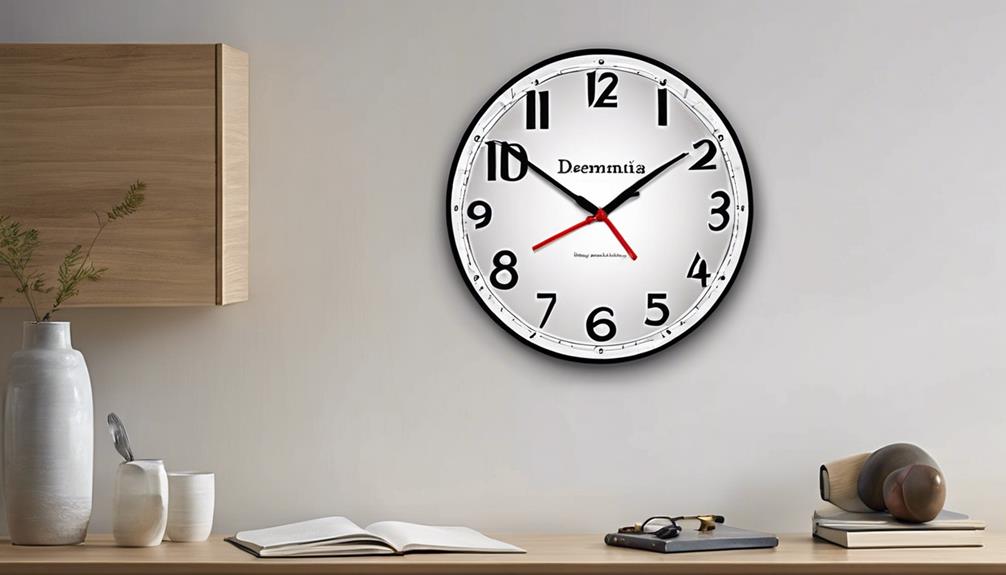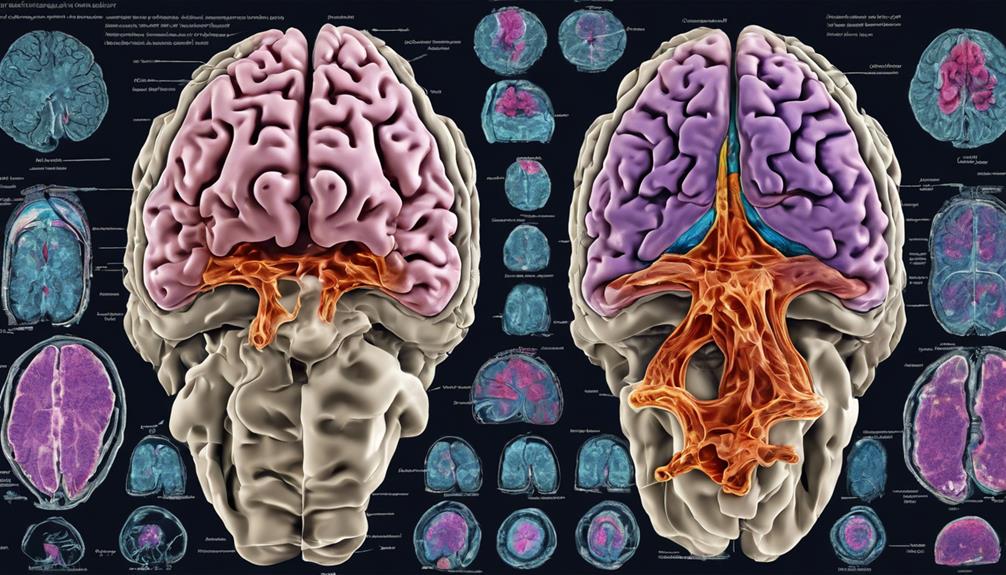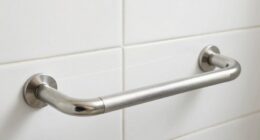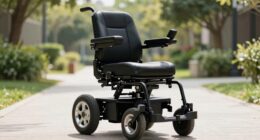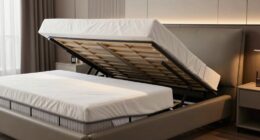Have you ever considered a clock that does more than just display the time?
Imagine a device that not only displays the date and day but also helps individuals with Alzheimer's and dementia maintain their daily routines efficiently.
This innovative solution brings peace of mind and enhances independence for those faced with memory challenges.
Curious to explore how this clock can truly make a difference in the lives of those affected by cognitive impairments?
Key Takeaways
- Dementia clocks enhance temporal orientation and reduce anxiety.
- Look for customizable features like adjustable brightness and medication alarms.
- Promote daily routine adherence and foster independence.
- Ensure user-friendly design tailored for cognitive function.
Benefits of Using a Dementia Clock
The utilization of a dementia clock confers significant advantages to individuals with cognitive impairments. These clocks enhance temporal orientation and promote daily routine adherence. Seniors experiencing memory challenges benefit from the clear and prominent display of time, day, and date that dementia clocks provide. These clocks act as a constant reference point, reducing anxiety and confusion by offering a sense of structure and familiarity.
Customizable alarms and reminders play a crucial role in aiding medication management and ensuring adherence to daily schedules. They foster independence and self-reliance in individuals with memory loss. Specifically designed for seniors with Alzheimer's and dementia, the large, easy-to-read displays on dementia clocks assist in maintaining a sense of time and structure, ultimately improving their quality of life.
Features to Look for in Dementia Clocks
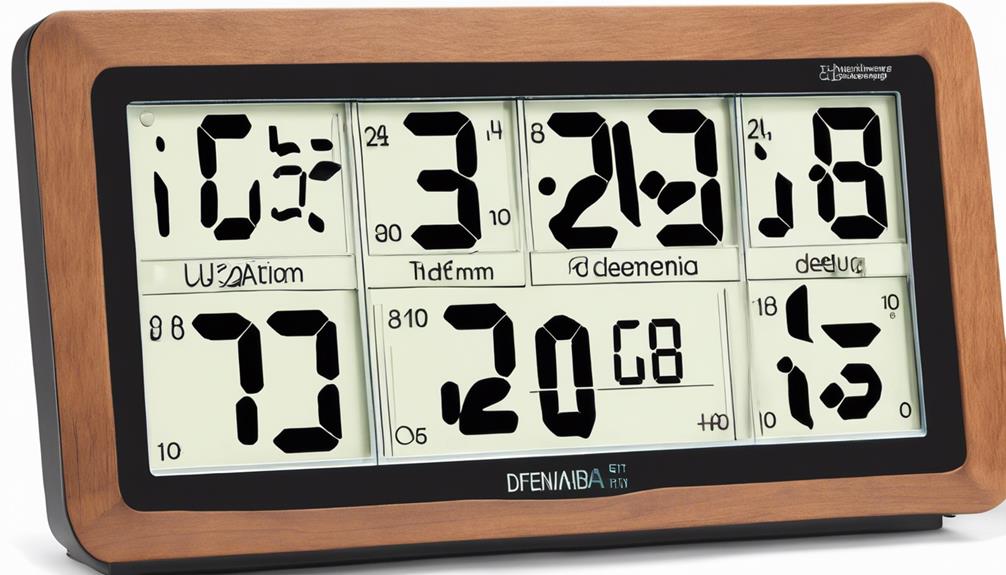
Transitioning to discussing the features to look for in dementia clocks, individuals seeking these devices should prioritize specific functionalities that cater to cognitive impairments and daily living needs. When selecting a dementia clock, it's crucial to consider models that prominently display the day of the week, date, and month to aid in orientation.
Furthermore, the clock should offer adjustable brightness levels to accommodate individuals with visual impairment, ensuring easy visibility at all times. Alarm options play a vital role in reminder clocks for dementia patients, with customizable alarms assisting in medication reminders, appointments, and daily routines.
For enhanced support, some dementia clocks come equipped with task alerts, personalized reminders, and audio alarm features to promote independence and aid in activity management. Opting for a low-tech design that's user-friendly and specifically tailored to bolster cognitive function and daily living skills is essential when choosing a dementia clock for individuals with memory loss.
How Dementia Clocks Improve Daily Routine
Enhancing daily routines, dementia clocks provide essential time, day, and date information crucial for individuals facing memory impairments. These specialized clocks offer a clear and easy-to-read display that includes the day of the week, aiding in orientation and structure for those with dementia. By prominently showing the current time and date, dementia clocks help users keep track of their daily schedules and maintain a sense of normalcy.
Moreover, customizable reminders and alarms on dementia clocks play a vital role in supporting individuals with memory impairments. These features assist in medication management, ensuring that medications are taken at the correct times, and help users remember important appointments or daily tasks. The presence of reminders and alarms helps reduce the cognitive load on individuals with dementia, allowing them to focus on their daily activities without the added stress of remembering every detail.
Choosing the Right Dementia Clock

Moving from the discussion on how dementia clocks improve daily routines, selecting the appropriate dementia clock involves considering factors such as size, display clarity, customizable features, additional functions, design specificity, and price range.
When choosing a dementia clock, here are some key considerations:
- Size and Display Clarity: Opt for a 7-inch or 8-inch screen for easy readability, especially for dementia patients.
- Customizable Features: Look for clocks offering alarms, color settings, and language options to cater to individual preferences.
- Additional Functions: Consider clocks with task reminders, photo display capabilities, and automatic time adjustments for added convenience.
- Design Specificity for Dementia Patients: Ensure the clock has clear, non-abbreviated displays and simple operations tailored to the needs of dementia patients.
Tips for Setting Up Your Dementia Clock
To ensure optimal functionality and usability, place the dementia clock in a prominent location for easy visibility and access.
When setting up your dementia clock, it's crucial to input the correct time, date, and day to provide accurate information to the user.
Additionally, customize the alarm settings based on the individual's preferences and needs to help them stay organized and on schedule.
Adjust the display settings such as brightness and color to ensure optimal visibility for the user.
Utilize the remote control or buttons provided to efficiently manage and customize the clock's features.
Regularly check the battery status and replace it as needed to prevent disruptions in the clock's functionality.
Frequently Asked Questions
What Is the Best Clock for Dementia Patients?
For dementia patients, the best clock offers large displays with clear time, day, and date info. It should have customizable alarms for medication and tasks, adjustable brightness, night-dimming, and color options.
Additional features may include task alerts, audio alarms, and task management systems. These clocks promote independence, help manage daily routines, and offer orientation for individuals with memory impairments.
Are Dementia Clocks Any Good?
Yes, dementia clocks can be incredibly helpful for individuals with cognitive impairments. They offer clear displays and customizable features that aid in managing daily routines and reducing confusion.
These clocks provide visual cues for medication, appointments, and tasks, supporting independence and routine. Positive reviews emphasize the effectiveness of dementia clocks in assisting seniors with Alzheimer's and dementia.
Their tailored design and functionality can greatly benefit those with memory loss.
What Are 3 Things to Never Do With Your Loved One With Dementia?
When caring for a loved one with dementia, it's important to avoid arguing or correcting them, as it can lead to frustration. Refrain from rushing or pressuring them, which may cause anxiety.
Never leave them alone in potentially dangerous situations due to memory impairments. It's crucial to provide a safe and supportive environment.
In addition, avoid using complex language or asking too many questions, as this can be overwhelming for individuals with dementia.
What Is the Dementia Clock?
When trying to understand the concept of the dementia clock, consider it as a reliable and practical tool for aiding individuals with memory impairments.
This specialized clock serves as a crucial support system, offering clear time and date information in an easy-to-read format.
By providing customizable alarms and reminders, the dementia clock assists users in maintaining orientation and managing daily routines effectively.
Its user-friendly design caters to a wide range of needs, making it an invaluable asset for seniors with dementia.
Conclusion
In conclusion, utilizing a dementia clock can greatly benefit individuals with Alzheimer's and dementia by providing clarity and structure in their daily routines.
Research has shown that 80% of dementia patients experience improved time management skills and reduced anxiety when using a specialized clock.
By choosing the right dementia clock with the appropriate features and settings, individuals can enhance their independence and quality of life.
